
Football victory for GMP women Team tops league in its first year


Football victory for GMP women Team tops league in its first year
GMP’s women’s football team has achieved a league-wide victory in its first year.
On Saturday 8 June, the team, which was launched in the summer of 2023 by DIs Andy Day and Tony Hanlon, took on West Midlands Police at Worcester’s Sixways Stadium in the Emergency Services Football League (ESFL) final, described by the league’s founders as ‘the pinnacle of emergency services football’.
After a thrilling 90 minutes, the final score was 1-0 to GMP, with PC Ellie Doggett scoring the match’s only goal and going on to be declared the Player of the Match.

Ellie commented: “It’s been a great achievement, in our first season together as a team to win the ESFL final – we couldn’t be more proud. It was an amazing experience and hopefully we can do the same again next season!”
The full squad consisted of Ellie Cook (captain), Becky Carter, Ellie Doggett, Molly Etchells, Ellie Evans, Lizzie Evans, Ellen Fazackerley, Lotti Hall, Jen Lomax, Molly Mackay, Niamh Mandeville, Georgina Newcombe, Sam Parkinson, Ellie Russel, Meg Searson, Liv Wild and Olivia Yeo.
Congratulations to all the players!
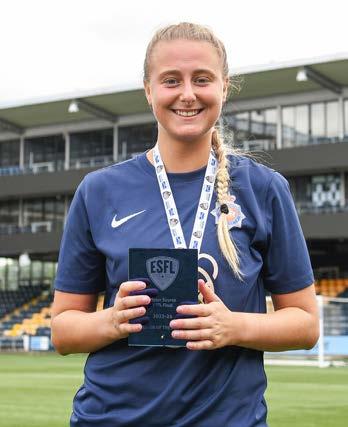


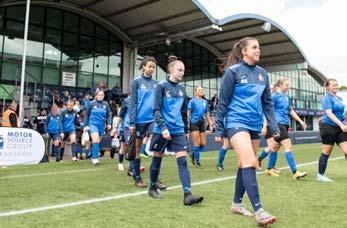
As you know, we have made significant strides in improving GMP over the past few years. We’re now in a much stronger position, having addressed many urgent needs and moved out of special measures. However, in order to continue our upward trajectory, we need to shift our focus towards developing a longer-term strategy for continuous improvement and sustainable transformation.
It has been a busy month for the GMP Future Delivery Programme team, who have started to kick off their Planning for the Future projects and engage with business leads to develop their five-year plans.
We all have a role to play in shaping the way GMP will look and feel in the future. I encourage you to start thinking about your vision for the next five years:
• What are our future initiatives and desired outcomes?
• What technology will we need?
• How might our workforce evolve?
• How can we improve value for money and deliver more for less?
• What activities are critical to our success, and what might we stop doing?
• How can we support and maintain staff wellbeing throughout this process? Together we can really make a difference for GMP!

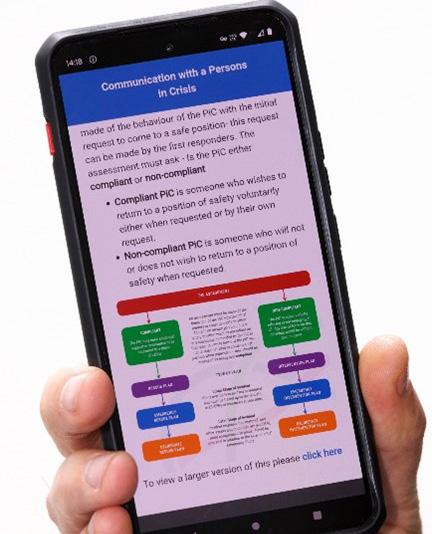
Police negotiators are highly trained specialist communicators who can be deployed to save life, reduce the threat to life or implement a communications tactic. Negotiators are also trained to undertake discreet and/or covert interactions if required.
The use of a negotiator can be a valuable resource in a variety of situations: they will focus on the negotiation and communication aspects of an incident and provide assessments that support an incident commander’s decision-making and development of other tactical options. Negotiators can also be deployed remotely through telephone or instant messaging services, such as text, email, or social media.
The team provides the organisation with a 24/7/365 response to ensure that any threat to life is dealt with in accordance with national guidelines. Incidents may include:
• Suicide intervention – where an individual is threatening self-harm.
• Missing persons – high-risk and/or vulnerable missing persons.
• Person in crisis or domestic siege – a spontaneous incident where a person is detained against their will. People in these circumstances
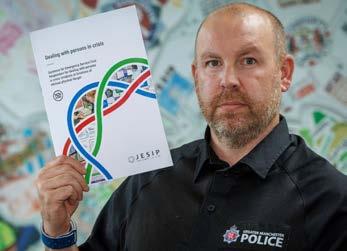
are often in crisis and/or under the influence of a substance which has affected their ability to respond in a rational or logical manner.
• Firearm operations – supporting operations such as the execution of a search warrant where firearms are known to be held, or where there is a threat of violence. The negotiator can encourage the suspect to allow peaceful, rather than forced, entry.
• Criminal sieges – including, for example, where a bank robbery is interrupted by the arrival of the police and where members of the public are being held by the offenders.
• Counter-terrorism incidents and investigations – the team has several specialist counter-terrorism (CT) negotiators to support CT policing operations.
The GMP Hostage and Crisis Negotiation Unit (HCNU) currently has an establishment of 30 trained negotiators, headed by force lead DCI Paddy Goodrich, deputy force lead Insp John Ormerod, and DS Craig Morgan, a full-time negotiator based in the Serious Crime Division. The team reports to the GMP strategic lead for negotiation, ACC Matt Boyle.
Hostage negotiators perform a demanding, specialised role in addition to their respective core duties within the organisation. The role requires dedication and commitment from each team member to maintain accreditation by deploying to incidents and attending CPD events and exercises.
It is important that each negotiator is always ready to perform at the best of their abilities so that they are prepared to deal with complex, often rapidly evolving situations at short notice and potentially save lives. It is often the case that extra support is needed, due to multiple ongoing incidents or complex sieges or investigations.
The GMP negotiator team is made
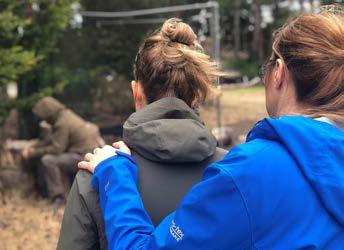
up from officers from across all districts and branches. The role is not rankspecific; in line with national guidance, GMP has opened the role to constables, with several PCs already passing the demanding initial two-week national negotiators’ course.
The team provides a negotiator coordinator and two negotiators on call every hour of every day, and aims to be at the scene of the incident within 45 minutes of receiving the initial request from the force duty officer. Prior to negotiator attendance it is often the initial first responders who deal with a person in crisis using their communication skills, caring demeanour and professionalism to try to bring them to a position of safety.
As a result of national and forcecentred organisational learning, GMP deputy lead Insp John Ormerod has worked with the National Negotiation Group to develop a national ‘Dealing with Persons in Crisis’ guidance document.
This guidance document, and the associated learning package, have been distributed to all first responders in the police, fire and rescue service and ambulance service and is designed to aid first responders when dealing with person in crisis incidents.
It is important that GMP officers and supervisors make themselves aware of the contents of this guidance document. GMP will be the lead agency for many of these incidents and GMP supervisors will be expected to have effective command and control whilst working with other key JESIP partners.
To assist officers, the JESIP app has now been updated to include a ‘Persons in Crisis’ tab which details the key aspects of the guidance document. When a negotiator coordinator provides advice to the officer or supervisor at the scene, they will highlight the content of the app.

Child protection is one of the most important aspects of what we do at GMP. It is not just a specialist role; protecting children and young people is everyone’s responsibility. At GMP we aim to practise trauma-informed, professionally curious policing, safeguarding vulnerable children and young people and disrupting the harmful and criminal behaviours of offenders who target them.
National Child Protection Inspection
Greater Manchester Police is gearing up for a comprehensive inspection of its child protection practices by His Majesty’s Inspectorate of Constabulary and Fire & Rescue Services (HMICFRS).
The national child protection inspection (NCPI) is set to begin on 22 July 2024 and will run for three weeks, concluding on 9 August 2024.
The inspection process will involve multiple phases:
• Case audits: GMP has submitted dip samples of cases to provide evidence of how we address child protection issues.
• Document submission: policies and procedures related to child protection will be reviewed.
• On-site visits: inspectors will conduct interviews and focus groups with staff at all levels, from chief officers to frontline constables in all districts and in numerous departments. They will also observe meetings and review performance data. Every member of GMP has a role to play in showcasing our commitment to protecting vulnerable children. Here’s how you can contribute:
• Be prepared: familiarise yourself with GMP’s child protection policies and procedures. Understand your role in safeguarding children, regardless of your primary duties.
• Showcase good work: don’t be afraid to highlight the positive impact you have made in child protection cases. Share examples of effective partnership working and innovative approaches.
• Embrace continuous improvement: as a forward-thinking force, we are always looking for ways to enhance our practices. If you are asked about challenges, share our ongoing initiatives and areas where we’re actively working to improve. This approach demonstrates our commitment to learning and development, helping HMICFRS understand our dedication to excellence in child protection.
• Engage with inspectors: if you are selected for an interview or focus group, approach it as an opportunity to demonstrate your knowledge and commitment. Be open, honest, and professional in your interactions.
• Maintain business as usual: the best way to impress inspectors is by demonstrating our day-to-day commitment to protecting children. Continue to prioritise child protection in your daily work.
In addition to the standard NCPI process, GMP will undergo a thematic inspection on CSE and CCE. This additional scrutiny reflects the importance of these issues both nationally and locally.
Professional curiosity refers to the communication skills needed to explore and understand what is happening for a person, rather than making assumptions or accepting things at face value. It requires skills of looking, listening, asking direct questions and being able to hold difficult conversations. When we speak about the voice of the child, we don’t just
mean when a child says or the tone with which they say it. The voice of the child encompasses all aspects of engaging meaningfully with a child: what they say; what they don’t say; how they look and behave; the environment in which they live –all of this builds a picture of the child’s experience.
The language that we use to describe the exploitation of children is important. It is never appropriate to use language about children and young people who have been commercially or sexually exploited, or those who are at risk of exploitation, which victim-blames, dehumanises, adultifies or normalises traumatic experiences.
It’s inappropriate to describe an exploited child as ‘streetwise’ or ‘seeking attention’. It’s unfair to say a child is ‘putting themselves at risk’, that they are ‘drug running’ or ‘recruiting’, or that they should ‘take responsibility for their behaviour’. It is cruel to say that a child is ‘promiscuous’ or ‘prostituting themselves’.
Young people who are in abusive or coercive situations are not in charge of what is happening to them. The responsibility lies with the adults who are exploiting them. No matter how challenging or uncooperative a child victim is, they are still a child; and it is our responsibility to protect them.
There are no formal qualifications or training needed to speak with a child or young person.
There is no legal requirement for a parent, carer or other adult to give consent for a police officer to speak to a child to establish the child’s welfare, or to be present when they do so.
When you speak with a child or young person who is at risk or has been exploited, consider how you want to make them feel. We don’t want to give exploited children the impression that they are in trouble or that we not on their side – we want them to feel that they can trust us and engage with the process.
Sometimes, children who are being exploited can be challenging or reluctant to engage. They may be hostile to the police as a whole, either due to negative experiences in the past or because they have been taught by their exploiters to see us as the enemy. They feel it is ‘too late’ for them or that exploitation is their only option. This behaviour is normal, and while it may be difficult in the moment, it is important to be kind and persevere. Children who are exploited are victims of crime, and it is our responsibility to protect them.
If child protection isn’t your specialism, or if you need advice or a second opinion, there are places you can go for help:
• Children’s Crime Allocation Triage sergeants are based in each of the DITs.
• In cases of online abuse, contact a digital media investigator.
• If a child or young person has gone missing, speak to a Missing From Home officer.
• For issues around partnership liaison, contact your local MultiAgency Safeguarding and Support Hub (the MASSH).
• The child protection hub on the intranet holds all the news, resources and advice you may need.
Scan here to visit the GMP child protection hub.

Greater Manchester Police is reinforcing its commitment to child protection with the appointment of Det Supt Alex Bacon as the new Force Lead for Child Protection and Missing, just as the force prepares for a comprehensive inspection by His Majesty’s Inspectorate of Constabulary and Fire & Rescue Services (HMICFRS).
Det Supt Bacon joins GMP from West Yorkshire Police, bringing a wealth of experience in child protection and safeguarding roles at every rank. His arrival coincides with the upcoming national child protection inspection (NCPI), set to begin at GMP on 22 July 2024.
“Child protection has always been my passion,” says Det Supt Bacon. “I’m humbled to take on this role at such a crucial time for GMP. The fact that we have two superintendents focused on child protection and child-centred policing demonstrates how seriously the force takes this responsibility.”
The NCPI, which will run for three weeks, marks the first comprehensive examination of GMP’s child protection procedures in over a decade. It will be accompanied by an additional thematic inspection focusing on child sexual exploitation (CSE) and child criminal exploitation (CCE).
Det Supt Bacon sees the inspection as an opportunity to showcase GMP’s progress and identify areas for improvement. “We’ve changed incredibly to address concerns, particularly with our complex safeguarding teams,” he notes. “They’re held up as national good practice, and we should be proud of the partnership working we’ve established.”
The inspection will scrutinise every aspect of GMP’s approach to child protection, from initial contact through to investigation and outcomes for children. HMICFRS inspectors will assess the force against five key criteria: leadership, partnership working, initial response, risk assessment and referral, and investigations.
All GMP staff have a role to play in demonstrating the force’s commitment to safeguarding. Det Supt Bacon emphasises, “This isn’t just about specialists. No matter what role you have, you’re part of our overall child protection approach.”
Staff can prepare by familiarising themselves with GMP’s child protection policies, being ready to showcase good work, and engaging openly with inspectors if selected for interviews or focus groups.
Looking ahead, Det Supt Bacon identifies increasing demand as one of the biggest challenges in child protection nationally. “We’re becoming more aware of the risks to children, particularly online and extra-familial abuse,” he explains. “Families are often unaware of these dangers.”
To address these challenges, Det Supt Bacon aims to develop GMP’s approach to the implementation of the new Working Together 2023 statutory guidance on child protection. This involves engaging with GMP’s 10 local authorities to ensure consistent levels of child protection services across the region.
The NCPI results, expected to be published several months after the inspection, will play a crucial role in shaping GMP’s future approach to child protection. Det Supt Bacon sees this as the beginning of a long-term journey. “I’m not just here for the inspection,” he says. “This is an opportunity to fast-track improvements and set the stage for ongoing enhancements to
our child protection practices.”
As GMP faces this pivotal moment, the force remains committed to its core mission of protecting vulnerable children across Greater Manchester. With new leadership and a focus on continuous improvement, GMP is poised to meet the challenges ahead and ensure the safety of the region’s most vulnerable residents.

Following the trial success of the Mini Police scheme in Wigan over the past year, GMP will begin expanding the project to all districts from September 2024 – the Mini Police even have their own crest, created by GMP Design Studio Manager Jay Ashworth, marking their official status at GMP.
To mark the forcewide launch, Chief Constable Stephen Watson and ACC Matt Boyle invited the Mini Police to Force Headquarters, alongside their teachers, school governors and the officers in charge of running the pilot in Wigan.
Alongside the Chief and ACC Boyle, representatives from all districts were in attendance to watch a presentation from the Mini Police about the fun, educational activities they have been a part of throughout the project, including a speed awareness operation; knife crime activity; first aid session; Remembrance Day parade; CCTV operation; hate crime talk; a visit to the Police Museum; and a visit from the NPAS helicopter. Teachers, officers and school heads spoke about the profound impact being engaged in the scheme has on the children, schools and communities involved.
Following their presentation, the children took the rare opportunity to quiz the Chief about his role: What made you want to be a police officer?
“It’s a really worthwhile job; you get to help the community and keep people safe, but you also get to ‘get the bad guys’ – we all want to do that, don’t we?”
Do you remember your first day?
“It was a really miserable rainy day in Nelson, I felt really proud with my big hat on and I still to this day remember the first member of the public I spoke to, even if I did get soaked wet through.” What’s been your favourite thing about being a Chief Constable?
“It’s great to lead such a large organisation; I enjoy watching
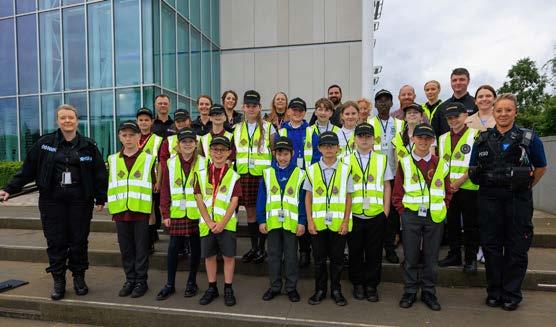

things come together and seeing the force succeed. Our main job is to protect the public, and I think by being the Chief I get a good chance at making a difference to people’s lives. One of the greatest feelings is when we are able to redirect money recovered from criminals to projects in the community that help and support those in need to reach their potential – it feels like God’s work.”
Have you ever been undercover?
“When I was a young officer I did apply to be a covert officer, but as soon as I walked in the room – before I even had a chance to sit down – the interviewer shouted ‘no, get out, you look too much like an officer for this role’! So I carried on my career in uniform.”
What has been your proudest moment?
“For me personally, my proudest moment was when I went to Buckingham Palace to receive my Queen’s Police Medal, it was fantastic to meet Queen Elizabeth and get to see such a spectacular palace along with my family. Professionally, I’m very proud of our officers, staff and volunteers for the work they do day in, day out to protect our communities.”
The Chief finished by explaining the importance of the Mini Police Officers’ role within their schools and communities and how important it is to use their influence positively and to keep making a difference.
Q&A with the Mini Police
Representatives from each district took their chance to ask the mini officers what it’s like being part of the scheme:
What made you want to be part of the Mini Police?
“I wanted to help the community be a safer place.”
“To have fun and learn about safety.”
“My mum works as a special officer and I wanted to help other people change their attitude towards the police.”
Has it changed your opinion of the police?
“I’m confident in saying hello to officers I see, and I now know the

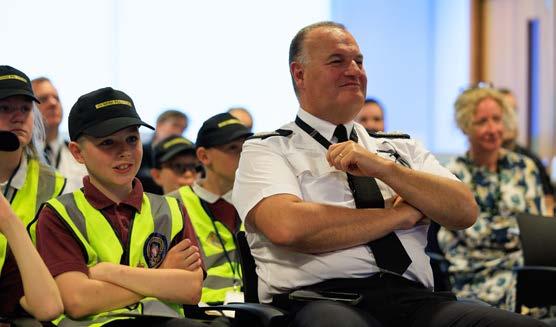
police do so much more than just arrest people.”
What do the rest of the school think about you all now you’re a part of GMP’s Mini Police?
“They think we’re braver, they’re jealous they’ve not been included.”
“They love hearing what we’ve been up to.”
“People treat me differently now, they come to me more for help.”
Do you want to join the police when you’re older?
“I’d like to be a footballer, but if that doesn’t work out then yes.”
The mini officers were also able to quiz Director of IT and Digital, ACO Dougie Henderson:
Do you ever get bored of tech?
“No – I don’t know if you can tell but I’m a bit of a geek, I love tech. I’m always thinking ‘what’s next’ and ‘what can we do to help everyone’. It never gets boring. We never stand still, tech is always evolving. We’re always looking to find solutions to help make the organisation better and more efficient.”
What is GMP’s main use of tech?
“At GMP we use a wealth of tech in everything that we do. Our staff and officers have laptops that they use to do their work, with communication apps like Outlook and Microsoft Teams being heavily used to connect the force. There are some more operational things like the Police National Computer (PNC) and Command and Control that officers use to find information about suspects and criminals and then we have things like Axon body-worn video that officers wear, allowing interactions with the public to be recorded. The latest update enables the video to be livestreamed, which is a huge benefit.”
After lunch, the Mini Police took charge of an activity in the Silver Command Suite, where Insp Jim Corrigan explained he
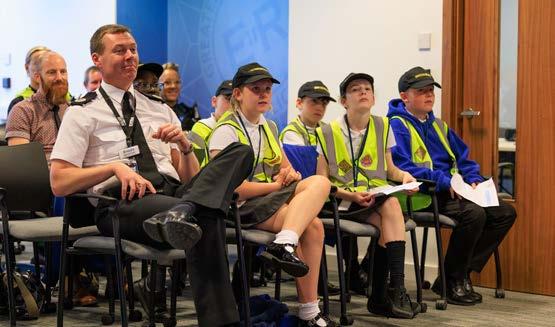
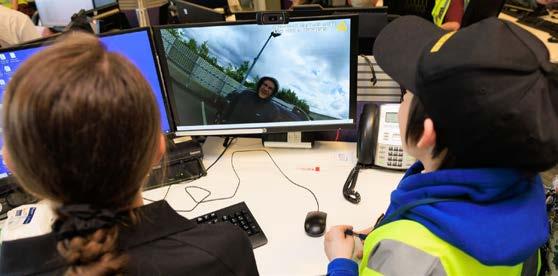
had received a report of suspects acting suspiciously nearby. The children utilised their communication skills by shouting up a description of the suspects on the radio to PC Barrie Lamb, who logged the description and sent officers to the scene.
Throughout the activity, the mini officers saw firsthand how the control room utilises technology to keep officers safe and aid investigations. A great example of this was the new AXON livestream facility, which enabled them to see the officer speaking to the suspect in real time, confirm they had the correct person and check that the police officer was safe.
Once the suspect was safely apprehended, the children came down to the car park to learn he was actually an undercover officer and the cars in the carpark were safe from harm.
ACC Matt Boyle commented:
“The Mini Police scheme will be rolled out forcewide this coming school year with the aim of increasing community trust and engagement. The trial in Wigan has been a huge success and I’ve heard nothing but fantastic feedback from both the schools and the community, praising the officers and children involved.
“To make the scheme a continued success in each district we will be delivering the scheme through our neighbourhood policing teams, who will be identifying appropriate schools, working with teachers and governors, selecting and attesting our Mini Police across Greater Manchester.
“The longstanding impact this will have on the children and communities involved cannot be underestimated. By showcasing the work we do through engaging experiences for children at an early stage, we are building trust and embedding long-term positive relationships with policing. In turn, the Mini Police are directly influencing their peers both to engage in healthy behaviours and to view the police as a positive presence within the community.”


In the final week of June, GMP celebrated its response policing teams as part of a national week of action.
National Response Policing Week of Action, which ran from 24 to 30 June, saw the force highlight the hard work, dedication and professionalism of its response officers, staff and volunteers as well as those who contribute to the response service.
There are more than 1,600 response officers in GMP, including 1,392 frontline PCs; each serving different areas across the region and responding to reports of all natures, from burglaries and robberies to fights and traffic collisions. Response teams will often be the first to attend an incident to assess the immediate risk of harm, initiate an investigation, and provide a reassuring visible police presence for the public. Our force control room receives almost 600,000 999 calls a year (1,600 a day), which are answered in around four seconds on average. In the past year, we responded to 135,726 Grade 1 incidents (calls that needed an
immediate response) across the Greater Manchester area – this is around 370 a day – with an average response time of nine minutes and 34 seconds on average, well inside the expected national average of 15 minutes.
ACC Matt Boyle, head of local policing at GMP, said: “Our response officers play a vital role in keeping the public of Greater Manchester safe every day of the year around the clock.
“Almost every officer starts on response; there is no doubt it’s one of the toughest, but also most rewarding, roles in policing. They will usually be the first officers on the scene of an ongoing incident and will often be the first person the public sees, so it is vital they are trained to the highest standards and have the latest kit and equipment – this will include vital life-saving training and the highest driving skills.
“We have invested £6 million in new uniforms for frontline officers, as well as upgrading their tasers and bodyworn video cameras. We are constantly reviewing the challenges our officers face and looking to see how we can
support them further, as well as raising awareness of the support services that are available and making sure they have the latest, most up-to-date equipment and technology.
“Response policing is the bedrock of every police force across the country. When the public call us, often in one of the worst moments of their lives, they rightly expect us to arrive quickly, act professionally, and protect them. This type of work can be extremely challenging, which is why there is also a focus on officers’ wellbeing this week.”
A key point of focus for the week was the importance of robust wellbeing support measures for response teams, promoting awareness of the wellbeing and resilience support services provided throughout the year by our occupational health unit, with access to a range of initiatives from the force and Health Assured, the force’s provider of counselling and wellbeing support. Response teams across Greater Manchester were also visited by a Salvation Army wellbeing van, serving hot dogs, tea, coffee and chocolate.
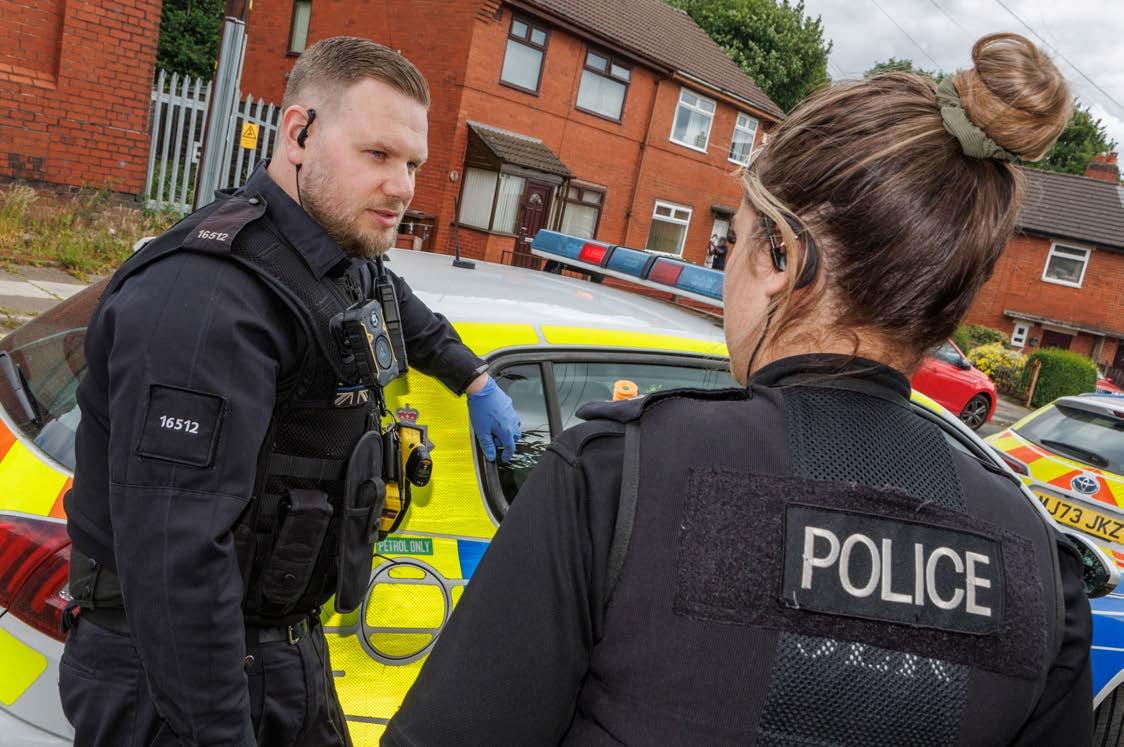
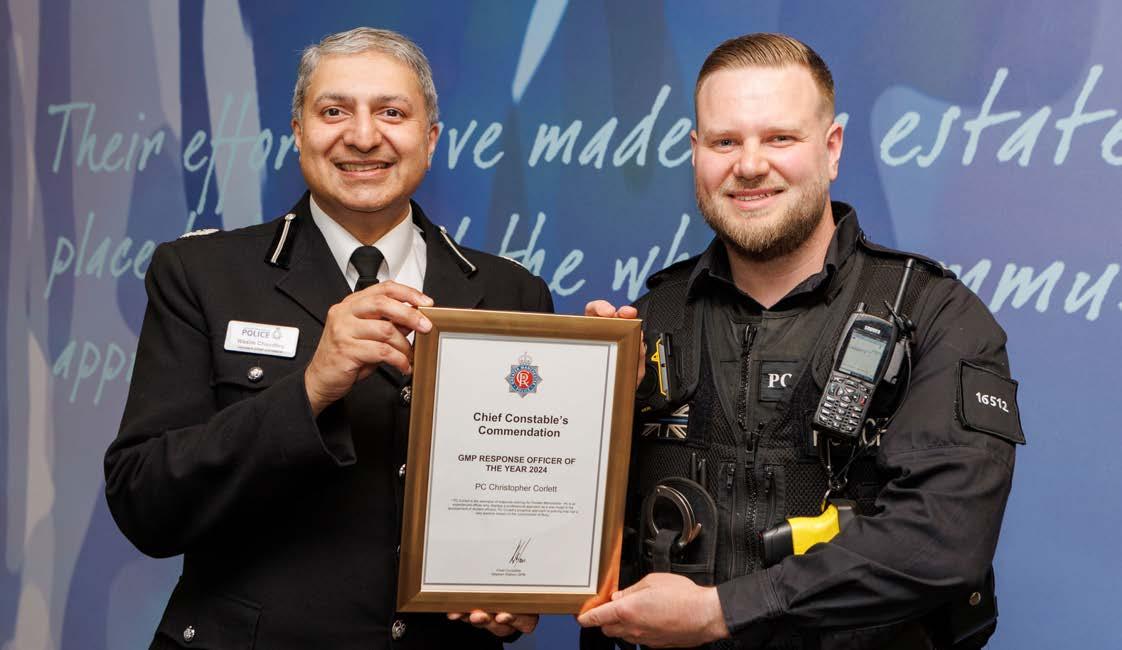
Bury PC Christopher Corlett has been named Greater Manchester Police Response Officer of the Year.
Throughout the year, he has led by example with his ‘relentless work’ and arrest rate. In the past year, PC Corlett has made 56 arrests, with more than half resulting in a charge or resolution. He also carried out dozens of stopsearches, with around 50% having a positive outcome.
PC Corlett, who began his career as a PCSO and has been with GMP for almost 12 years, said: “I was surprised but delighted to have won the award – it’s great to have the support and backing of your team leaders.
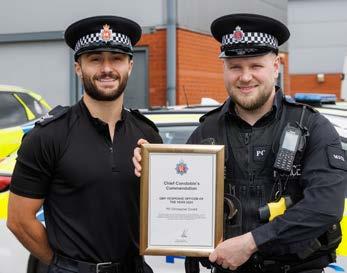
“I love the variety of the job and the team dynamic we have; I am a proactive officer and love going out to arrest people and stopping vehicles. Because I am taser trained, I am often sent to the tougher, more exciting jobs.”
Supt Chris Hill, district commander for Bury, said: “It is rare that officers receive praise for the relentless work they undertake, but PC Corlett’s nomination was an immediate and unanimous decision. He’s a huge asset to policing and we could not think of anybody more deserving to receive this award.
“Throughout the entirety of his police service within GMP, PC Corlett
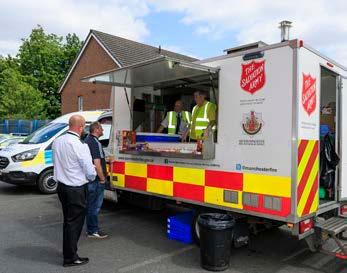
has served tirelessly as part of the frontline response team. He is often heavily relied on when developing his less experienced colleagues’ skills and improving their confidence when dealing with live incidents, offenders and members of the public.
“He has always worked diligently and been an impeccable example to all his colleagues and has continually delivered the highest standard of service to the Bury community via his proactive attitude to policing.”
PC Corlett will now be put forward for the National Police Chiefs’ Council Response Officer of the Year awards, taking place later this year.
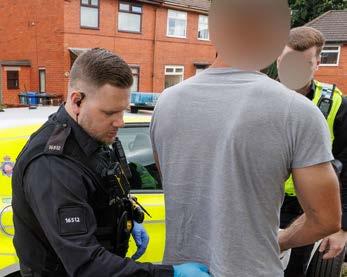
The Ben Fund
A new process for accessing physiotherapy support at St Michael’s Lodge is now in place, and members of the Ben Fund (which is only eligible for officers) are no longer able to apply for residential physio treatment directly.
All applications for physio support will now go through outpatient services, which can be completed at St Michael’s Lodge, situated in Ribble Valley, or at Progress House in Stockport.
During the initial assessment, the physiotherapist will decide if the individual would benefit from an inpatient stay and progress if appropriate.
For more information on The Ben Fund, including forms to apply for treatment, please visit their website: www.thebenfund. co.uk.
We are actively recruiting new volunteers across the wellbeing network!
You can get involved in wellbeing through a wide range of roles and responsibilities. You will be given training, continuous support, regular supervision, an annual appreciation event, a yearly continuous professional development (CPD) day with other volunteers, and the opportunity to link in with like-minded people.
You can put in expressions of interest for the following:
• Peer Supporter: use your own experiences of mental ill health to support others
• Wellbeing Resilience Coach: support colleagues on whole range of issues affecting their wellbeing
• Grief First Aiders: support others going through a difficult time
• Welfare Peer: support colleagues under investigation
• Peer Champion: receive training in delivering wellbeing inputs to students, apprentices, teams within your place of work
You can find more information on any of these roles on the intranet by navigating to Home > Wellbeing > Internal Support > Peer support volunteer networks.
If you have any questions about wellbeing in your district or branch, or would like to join your district or branch wellbeing committee, contact your wellbeing SPOC – you can find a list of SPOCs on the ‘Peer support volunteer networks’ page.
You can learn more about our informal support groups via Home > Wellbeing > Internal support > Informal peer support groups.
This year saw the GMP Wellbeing team undertake its fourth roadshow around GMP to showcase the array of internal and external support available to all our colleagues.
In another record, 1,124 individuals engaged in conversation about their wellbeing and signposting support services. The team would like to thank every person who was involved, from the Business Support Services teams and SPOCs who helped with the coordination and promotion, to Oscar Kilo for allowing the use of their van and our drivers for moving the van to each location, to each and every single person who took some time to come and talk with us.
We would also like to thank all our partners, internal and external, who took the time to support us.
The Wellbeing team was joined by:
• Costco
• Dad Matters
• Grief First Aiders
• GSN
• Health Assured
• Menopause Ambassadors
• No1 Copper Pot
• Occupational Health and Wellbeing Service
• PMAS
• Police Care
• Police Treatment Centre
• Public Health Collaboration
• Samaritans
• TRiM
• Unison
For more information please contact the team at WellbeingVolunteerCoordinators@gmp.police.uk
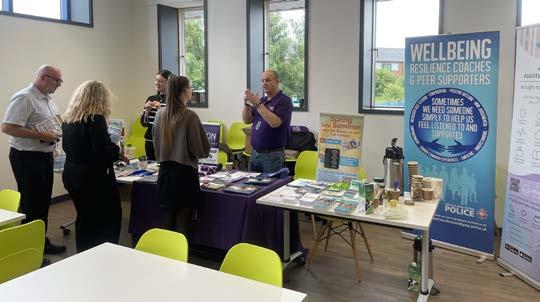
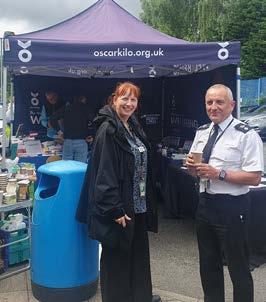
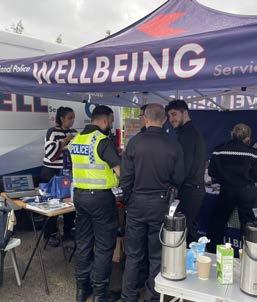
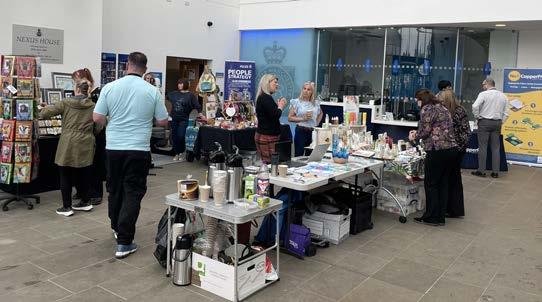
This month GMP celebrated Armed Forces Week, launching on 24 June and culminating on Armed Forces Day on 29 June: a national celebration showing support for the individuals who make up the UK military community, from currently serving personnel to service families, veterans, and cadets.
GMP has long held a close relationship with its military partners; and the GMP Armed Forces Network consists of more than 260 military veterans, reservists and colleagues with a close connection to the armed forces.
Flag-raising – Force Headquarters
Monday 24 June, the first day of Armed Forces Week, saw the raising of a flag at GMP Force Headquarters commemorating GMP’s ongoing and constant support for the armed forces.
DCC Terry Woods and Greater Manchester Deputy Mayor Kate Green hoisted the flag, and ACC Chris Sykes addressed the crowd.
Flag-raising – Sedgley Park
On Wednesday 26 June, Reserves Day, the People and Development Branch
held a flag-raising ceremony at Sedgley Park.
The date was specifically selected to recognise and celebrate the work of the reserve forces, and to honour GMP colleagues who serve as reservists.
The parade was led by People and Development Branch Commander
Ch Supt Niall Hayden-Pawson, who addressed attendees with a message of awareness and thanks for Armed Forces personnel both past and present for their service.
Since its launch in November, the Forcer Protocol has helped find over 100 military veterans who have gone missing from home.
The protocol is a veteran-centred initiative used by the police to ensure key information is available when searching for service veterans who are lost or have gone missing. Following a successful six-month pilot at GMP, the first force to implement the protocol, it has begun to roll out to police forces nationwide.
Earlier this month, Ch Insp Mark Mangnall and Change Project Manager
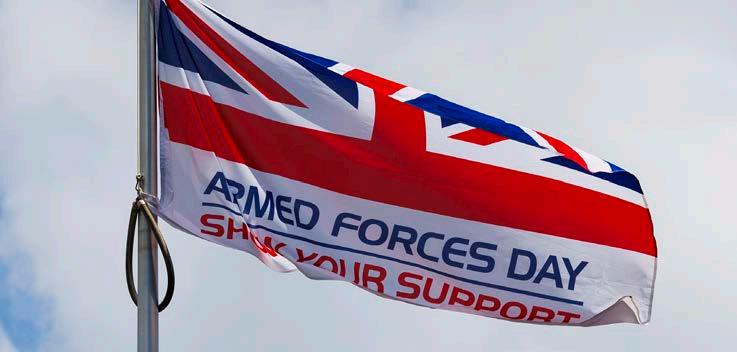
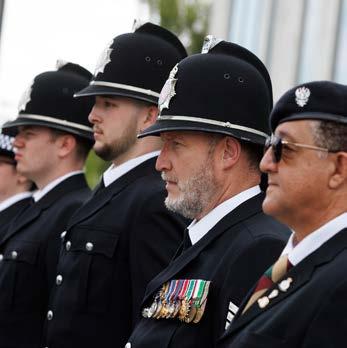
Geoff Hurst attended the national launch of the protocol at Hyde Park Barracks at Knightsbridge, London. The event saw representatives from across UK forces, as well as an update and progress report on the GMP pilot.
Following Cumbria’s implementation of the protocol, other forces have since followed suit; with Northumbria ready to implement the protocol in July.
Chief Inspector Mark Mangnall said:
“The Forcer protocol has already identified and located 116 missing veterans, with this number increasing each week. Approximately 40% of these veterans have been referred to Operation Nova for help and support. This referral is a crucial step in reducing the demand and recurrence of missing persons cases.
“I am proud of the work we are doing to support our armed forces communities here in Greater Manchester, and it is gratifying to see our efforts being rolled out nationally. Cumbria has started to identify and locate missing veterans since their launch in May 2024, and we have significant interest from other forces, with two more coming on board in July.”

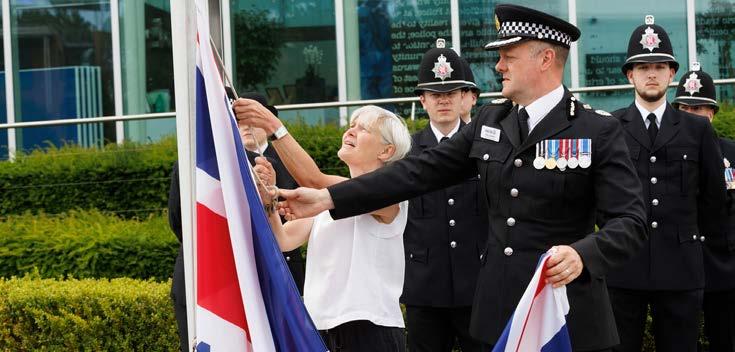

DC Alex Giblin currently works as an investigating officer, roads policing lead investigator (RPLI), and Family Liaison Officer (FLO) within the Serious Collision Investigation Unit (SCIU). She splits her time between investigating road traffic collisions which have resulted in fatalities or serious injury and supporting the families of victims through the course of an SCIU investigation, from the initial launch all the way to a coroner’s court hearing.
What was your experience before SCIU?
I joined Greater Manchester Police in 2019 and worked on response for three years, where I gained my initial experience and became an FLO. I was able to bring my experience over to the SCIU in 2022: I have an active role in the unit, where I am an officer in case (OIC) for investigations, an FLO, and have recently become an RPLI.
What attracted you to the role in SCIU?
While working on response, I developed an interest in attending and investigating road traffic collisions, as well as taking on more lengthy and complex investigations into a variety of offences
– as a response officer, this is typically very difficult to do, as you are usually responding to jobs and have limited time to complete enquiries and put files together.
The SCIU appealed to me for the investigation side, as the investigations are complex and you have the time to properly investigate road traffic collisions from start to finish, but also for the FLO side; as this is different to being a FLO assisting divisions and the major investigations team (MIT).
What is the role of a FLO like in SCIU?
Being a FLO in the SCIU is a challenging role. You are the point of contact for the victim’s family throughout the entire investigation. It’s such an important role, as you build a strong relationship with the family and this can assist the investigation, especially as you’re with the family from the earliest point after the collision through to the court and/or inquest process.
It’s an interesting role because you get to see another side of the investigation, it helps you to understand the impact of the work that the SCIU do. You also liaise with internal and external parties, such as the press office, police coroner’s officers (PCOs), charities and the coroner’s office.
What is an average day for you as an investigator and a FLO?
My day-to-day role as an OIC, RPLI and FLO can consist of turning out to a collision, managing a scene, conducting enquiries, obtaining CCTV, taking statements, visits to families, attending court, building files and attending Home Office postmortems.
Each day can be different, depending on what investigations are running: some days can be busy, being out all day with enquiries or at court with families, with other days allowing the time to review investigations and evidence that has been gathered for jobs. No two days are the same – but that’s what I enjoy about the unit.
How do you manage your time between being an investigator and a FLO?
It’s a lot to take on, as I switch between both roles; so it’s just about
knowing what to prioritise, good time management and asking for help if needed. I carry many families for fatal collisions at any time, all at different stages of the investigation. I schedule regular phone calls and visits with families so that I can provide them with updates when necessary and ensure they are kept in the loop.
Everyone in the SCIU is supportive and will help, whether with CCTV trawls, taking statements or interviewing suspects – everyone in the unit appreciates the work we do and takes pride in their role.
What is the most rewarding part of being a FLO?
The role of a FLO can be demanding, although I would say it is very rewarding. Families find themselves in an unimaginable position where they have unexpectedly lost a loved one, and then at the same time they suddenly have the police in their life, investigating the death of that person. I am proud to be able to support families during the difficult and lengthy process and always look to provide them with the best service I can, knowing that if the roles were reversed and my family were in that unfortunate position, that they would be looked after and given that same service any family deserves.
What makes the SCIU stand out for you?
I would recommend the SCIU to anyone who enjoys getting stuck into investigations that vary from job to job and take pride in their work. It’s a great unit because of the interesting and complex investigations that we take on, as every collision is different. In the SCIU, you have the time to conduct enquiries and can make sure that every detail is checked.
The level of responsibility may seem daunting, as you’re investigating death at the rank of a constable, however you have support from your colleagues in the unit and have the resources necessary to make sure all lines of enquiries are checked. Over time, you will gain knowledge and experience and have the chance to move on to being a roads policing lead investigator or a Family Liaison Officer.